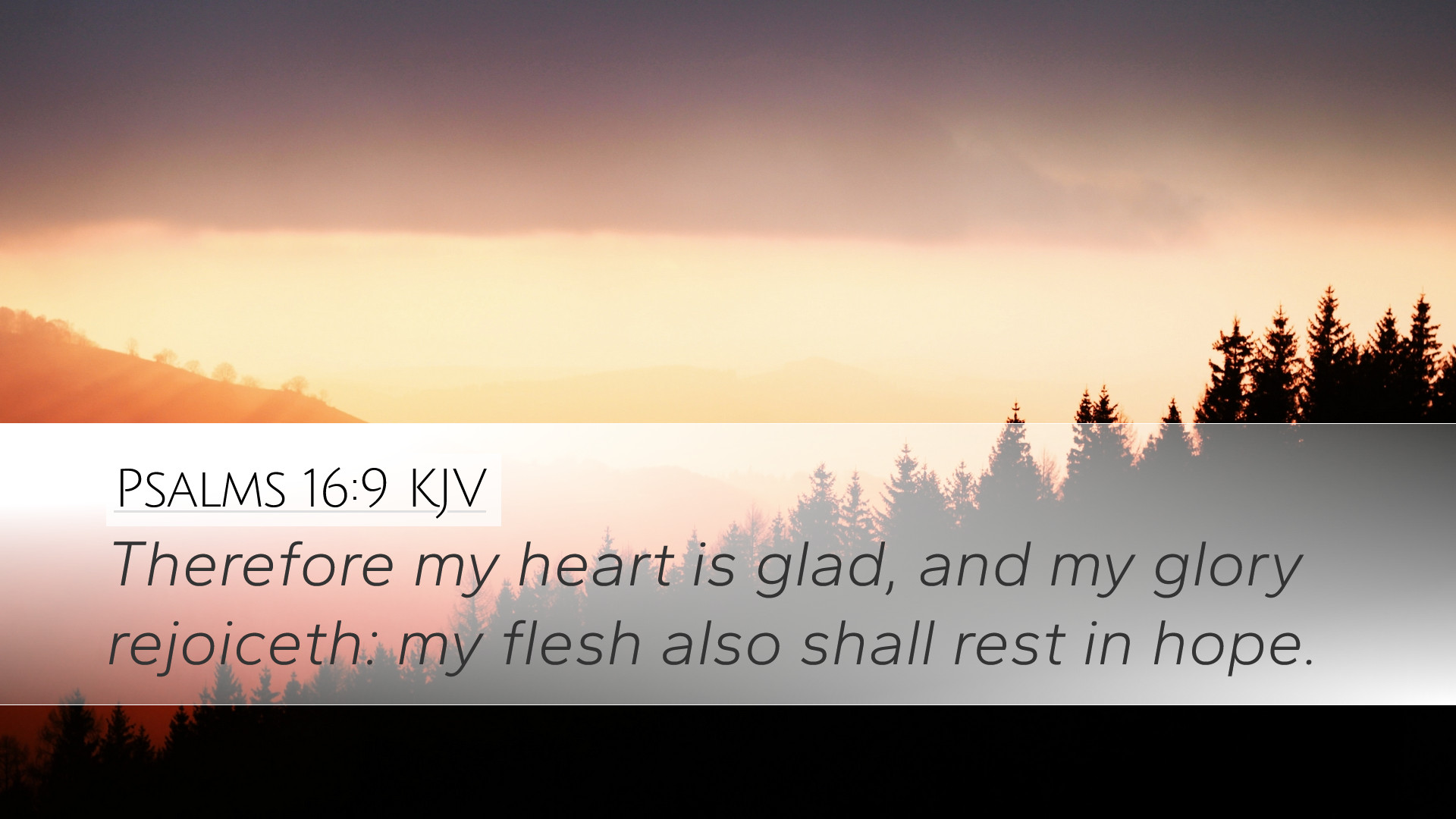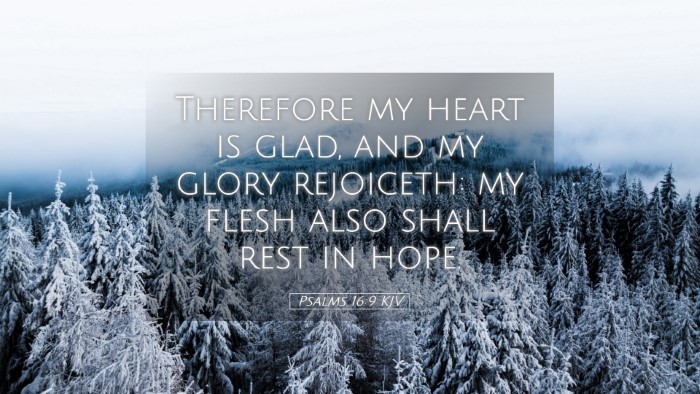Psalms 16:9 Commentary
Bible Verse: Psalms 16:9 - "Therefore my heart is glad, and my glory rejoiceth: my flesh also shall rest in hope."
Introduction
The verse Psalms 16:9 encapsulates a profound sentiment of joy and hope that arises from the psalmist's trust in the Lord. It provides rich ground for reflection and expounds upon the human experience of gladness tied to divine assurance. The insights drawn from historical commentaries by Matthew Henry, Albert Barnes, and Adam Clarke shed light on the theological implications as well as practical applications of this passage.
Exegeses and Insights
Matthew Henry's Commentary
Matthew Henry, in his exposition, emphasizes the connection between gladness of heart and the security that faith brings. He notes:
- Gladness of Heart: Henry points out that true joy stems from a relationship with God, contrasting temporary feelings initiated by external circumstances. God's presence yields enduring gladness.
- Rejoicing in Glory: The term "glory" refers not merely to outward achievement but to the inner dignity and spiritual stature of the believer. Henry stresses that this rejoicing comes from recognizing one's standing before God as redeemed and valued.
- Rest in Hope: Henry elaborates that resting in hope signifies a deep-seated peace that accompanies one's faith. This hope is an anchor for the soul, grounded in the promises of God about eternal life, leading to both spiritual and physical assurance.
Albert Barnes' Commentary
Albert Barnes offers additional reflections focusing on the stability provided by faith:
- My Heart is Glad: Barnes highlights that the "heart" symbolizes the core of human emotions and decisions. He observes that a heart filled with divine joy is unaffected by external pressures, illustrating the transformative power of faith.
- My Flesh Shall Rest in Hope: In assessing the notion of the flesh resting, Barnes interprets this as a serene submission to God's providence, a state of tranquility amidst life’s turmoil. This also alludes to the believer’s confidence in the resurrection and the promise of eternal life.
Adam Clarke's Commentary
Adam Clarke takes a deeper linguistic approach, elaborating on the original Hebrew meanings:
- Gladness and Rejoicing: Clarke explains that the terms used here imply a state of exuberant joy, reflecting a heart that is liberated from fear through God's support. This joy is not superficial; it is deeply rooted in God's covenantal relationship with His people.
- Rest in Hope: Clarke expands on the concept of "rest," indicating that it encapsulates physical, emotional, and spiritual peace. This rest is a reflection of trust, representing the believer’s assurance in God’s unchanging nature and His promises for the future.
Theological Implications
This verse is rich in theological significance, emphasizing themes of joy, hope, and the assurance of God's protection. The juxtaposition of heart and flesh points to a holistic view of human existence—spiritual and physical aspects being intertwined under God's sovereign care. The psalmist, amid trials, finds rest not only in current circumstances but also in God's eternal promises, illustrating a robust faith that encompasses both present joys and future hope.
Application for Pastors and Theologians
For pastors and theologians, Psalms 16:9 serves as a central pillar for understanding the human condition in relation to divine providence. It encourages church leaders to convey messages of hope in Christ and to foster an environment where individuals can encounter true joy sourced in a genuine relationship with God. Furthermore, this verse can drive home the importance of grounding congregational teachings in the assurance of God's eternal promises, thus nurturing a resilient faith among believers.
Conclusion
Psalms 16:9 encapsulates profound themes that resonate deeply within the Christian faith. Through the insights drawn from esteemed commentaries, we observe a psalm that beautifully marries joy and hope, inviting believers into a deeper understanding of God’s unwavering support. As Christians engage with this text, they are reminded that their hearts can find gladness in the Lord, and their flesh can rest in the hope of eternal life.


